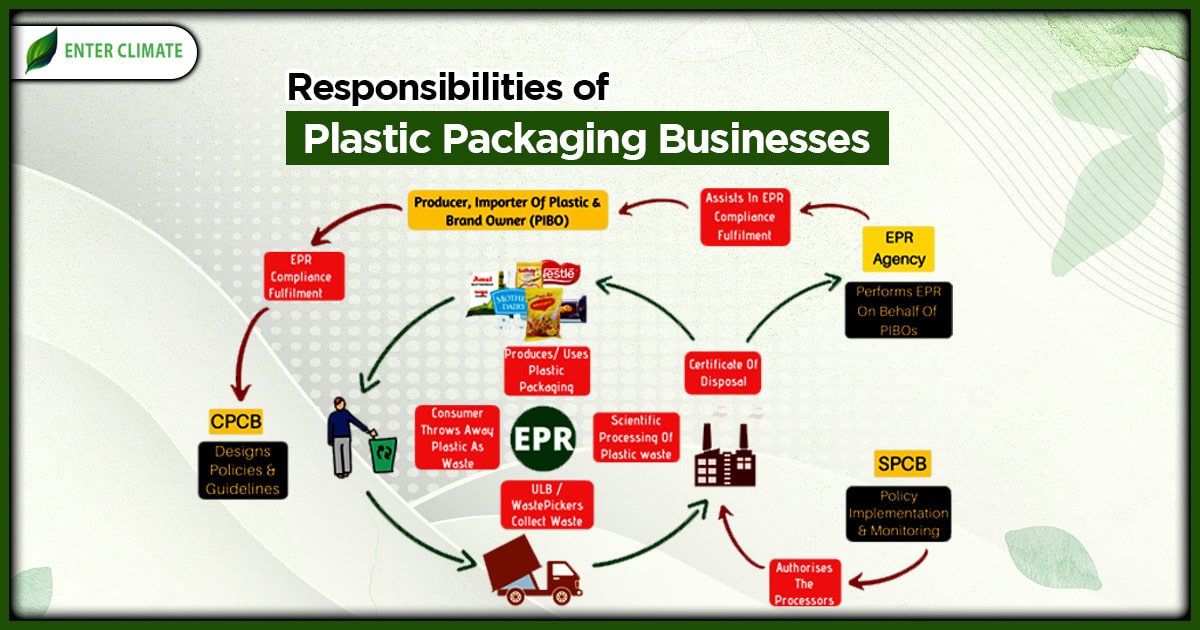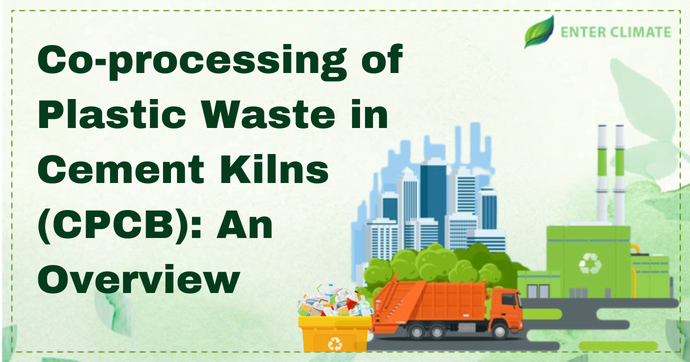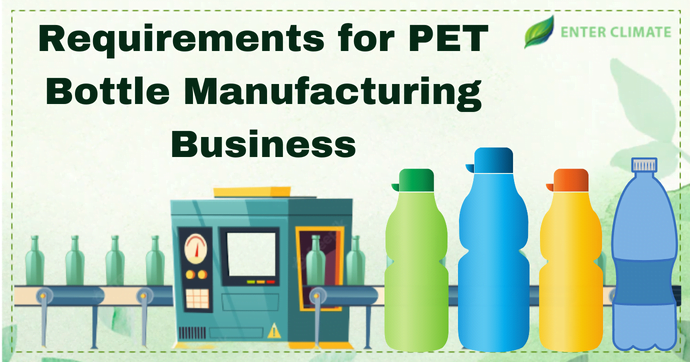Responsibilities of PIBOs under EPR for Plastic Packaging
 25 Sep, 2023
25 Sep, 2023 
Extended Producer Responsibility (EPR) is a legal responsibility imposed on producers of certain products that the producer introduces in the market that are potentially hazardous after the end of their life. The EPR regime applies to producers (including manufacturers, importers, and brand owners) and recyclers in 4 sectors: plastic packaging, electronic and electrical equipment (EEE), vehicle tyres and batteries. The Plastic Waste Management Rules, 2016, Hazardous Waste Management Rules 2016, E-Waste Management Rules, 2022 and the Battery Waste Management Rules 2022 lay down the modalities of EPR in plastic packaging, e-waste, used tyres and end-of-life batteries, respectively.
CPCB, which is the nodal pollution control authority, is supervising the implementation of EPR for plastic packaging in the entire country, along with the assistance of SPCBs/PCC. CPCB is managing dedicated centralised EPR portals for registering businesses that fall under the ambit of EPR. In this article, we will understand the responsibilities imposed on enterprises covered in the purview of EPR under sectors vis-à-vis plastic packaging as per the PWM Rules, 2016 and cover the provisions laid down under the EPR Guidelines of 2022.
What is the relevance of EPR for PIBOs?
EPR for plastic packaging, as a policy, creates a legal responsibility for the waste management of the end-of-life of these products, including their recycling/ co-processing/ disposal and any associated environmental impacts of plastic waste. To reduce the waste management cost from the public exchequer and promote a circular economy, the government has made strict guidelines and monitoring mechanisms to implement EPR, which has become necessary for these businesses. EPR for plastic packaging is governed by 2022 EPR Guidelines that ensure recycling entities (co-processors/ recyclers/ WTE plants) perform eco-friendly recycling and disposal of plastic waste. Under the current version of the Plastic Waste Management Rules, 2016, the following entities have been identified to fulfil EPR.
Producer (P)
Importer (I)
Brand owner (BO), and
Plastic Waste Processor, which includes entities engaged in (a) recycling, (b) waste to energy, (c) waste to oil, and (iv) industrial composting.
EPR-related responsibilities made applicable to PIBOs
Registration of Producers, Importers & Brand-Owners (operating in one or two states), and Plastic Waste processors is being done by the State Pollution Control Board (SPCB) or Pollution Control Committee (PCC) through the centralised EPR portal developed by the CPCB. The entities identified under the Rules cannot carry any business without registration under EPR for plastic packaging. The following EPR guidelines have been laid down for PIBOs.
- The PIBOs will have to register through the online centralised portal and can start functioning only after the certificate of registration has been issued on the portal.
- PIBOs will need to provide an EPR Action Plan with information on the category-wise EPR Target, along with the application for registration or renewal of registration under PWM Rules, 2016.
- The brand owner must provide details of plastic packaging purchased from producers and importers separately. The quantities attributed to each Producer and Importer covered obligated upon the Brand Owner will be deducted from the obligation of producers and importers.
- The Producers and Importers will be required to maintain a record of the quantity of plastic packaging material made available to the Brand as a part of their EPR for plastic packaging.
- The Producers, Importers and brand owners must file annual returns on the plastic packaging waste collected and processed with the CPCB or SPCB/PCC as per pro forma prescribed by the CPCB by the 30th of June of the next financial year.
- The PIBOs should not deal with any unregistered entities. Furthermore, if any entity registered on the online portal has wilfully concealed information or provided false information, then the registration of such an entity would be revoked for one year after being provided an opportunity to be heard. The entities whose registration has been revoked will not be able to register afresh for the revocation period.
- If any entity falls into more than one sub-category as per the guidelines, then the entity will have to register under each sub-category separately. In cases where the entity has units in different states, then these units will also need to register separately under EPR for plastic packaging. However, only one registration under a sub-category in a state would be needed, even if more than one unit is located in a state. The registration shall be as per the SOP aid down by CPCB.
- Only those plastics which cannot be recycled will be sent for end-of-life disposal, such as road construction, waste to energy, and waste to oil, as per relevant guidelines issued by the Indian Road Congress or Central Pollution Control Board from time to time.
Targets for Extended Producer Responsibility
The EPR Targets and obligations of Producers, Importers and brand owners are determined category-wise and have been explained in the following sections.
For Producer: In the case of producers, for calculation of EPR targets, the eligible quantity will be the average weight of plastic packaging material (as per the plastic category and measured in MT) sold in the last two financial years plus the average quantity of pre-consumer plastic packaging waste in the last two financial years minus the annual quantity supplied to the entities in the previous financial year. For the financial year 2023-24, the EPR target for producers will be 100% of the eligible quantity.
For Importers: In the case of Importers, for calculation of the EPR targets, theeligible quantity will be the average weight of all plastic packaging material or quantity of plastic used for packaging the imported products (category-wise) that has been imported and sold in the last two financial years plus the average quantity of pre-consumer plastic packaging in the last two financial years’ waste minus the annual quantity supplied to the entities covered in the previous financial years. The EPR target for importers from 2023-24 onwards is 100% of the eligible quantity.
For Brand Owners: In the case of Brand owners, for the calculation of the EPR target, the eligible quantity will be the average weight of virgin plastic packaging material (category-wise) purchased and introduced in the market in the last two financial years (A) plus the average quantity of (B) of pre-consumer plastic packaging in the last two financial years. The EPR targets for Brand owners for the year 2023-24 will be 100% of the eligible quantity.
Obligation for recycling for PIBOs under EPR for plastic packaging
The Producer, importer and Brand Owner will need to ensure a minimum level of recycling that does not include end-of-life disposal as a part of their EPR target, as per the table below.
| Plastic category | 2024-25 | 2025-26 | 2026-27 | 2027-28 and onwards |
| Category I | 50 | 60 | 70 | 80 |
| Category II | 30 | 40 | 50 | 60 |
| Category III | 30 | 40 | 50 | 60 |
| Category IV | 50 | 60 | 70 | 80 |
Note: The identified entities must fulfil their respective EPR obligations and targets to keep operating in the country.
Role of Centralised EPR Portal
The centralised CPCB portal plays a crucial part under the EPR for plastic packaging. Apart from EPR registration, the portal also provides for calculating annual EPR targets for PIBOs, maintaining records of recycling plastic packaging waste, and keeping check on entities engaged in waste plastic packaging.
CPCB’s EPR portal is operational and assists in the EPR-related obligations in all these sectors. It is a centralised platform for the entire nation. It works as a single-point data repository for EPR registration, submission of data related to the operation of PIBOs/ trading of EPR certificates and submission of annual returns. The EPR guidelines also include providing heavy environmental compensation, surprise inspection by agencies, and cancellation of their CTO/ closure of the facility.
Conclusion
If you are a business that introduces a product in plastic packaging in the market in the four plastic categories (rigid, flexible, multi-layered or compostable plastic), you will need to fulfil your EPR for plastic packaging and achieve your recycling targets generated by the portal. As a business falling under the PIBO category, you can collaborate with registered recyclers/co-processors/ and PWPs who can recycle proportionate plastic waste on your behalf or purchase EPR certificates from recyclers. PIBOs that are operational in one or two states/UTs are also required to register with the concerned SPCB/PCC. In case of EPR registration, you will need a copy of the valid consent certificate, the Company’s PAN, CIN & GST (the combined copies of GST invoices[1] in all the States/UTs where the PIBO is operating), the authorised person’s PAN & Aadhar, details of the quantities of plastic packaging, etc. The EPR-related modalities for PIBOs can, however, be complex and time-consuming. So, it is recommended that the identified entities take the assistance of EPR experts in registration and EPR-related compliance management from experts.
FAQs
Extended Producer’s Responsibility (EPR) is a concept under which producers are given a significant financial and/or physical responsibility for the treatment or disposal of products post-consumption.
EPR aims to place responsibility on certain stakeholders for the proper recycling/disposal of plastic waste. The government had issued a notification in this regard in 2022 known as the EPR Guidelines to outline the EPR obligations of PIBOs.
Extended producer responsibility (EPR) focuses on the responsibility of the producer for the impacts of their product in the final stage of its life cycle, after consumption, and gives producers a greater motivation to design products that minimise environmental and health impacts.
The Guidelines stipulate fulfillment of annual targets on EPR, recycling of plastic packaging waste, diverting majority of recyclable plastic waste into the recycling sector instead of disposal and using recycled plastic into the manufacturing process. The guidelines aims towards sustainable plastic packaging and reducing the plastic footprint of plastic packaging.
EPR isa practice and a policy approach in which producers take responsibility for managing the disposal of products they produce once they are designated as no longer useful by consumers.
Read our Article: EPR Authorisation for Plastic Waste Management













